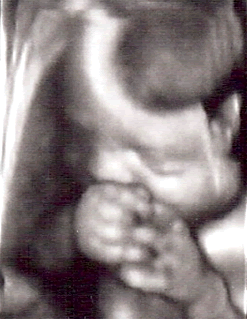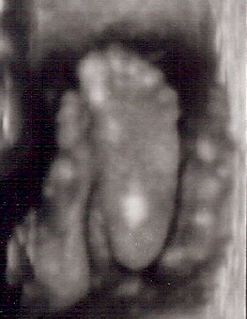- Prenatal Care
- High Risk Pregnancy
- Fetal Monitoring
- In-office 4D ultrasound
- Cesarean Delivery
Prenatal Care
Early and regular prenatal care can help keep you and your baby healthy throughout your pregnancy. By receiving prenatal care, we can spot health problems early and provide the necessary treatment.

Your first prenatal appointment should be scheduled at approximately six weeks into your pregnancy. During the initial visit, an ultrasound will be performed to confirm that you are indeed pregnant and to help establish your due date. A pelvic exam will be done to collect cultures and a pap smear will be done if one has not been performed within the last six months. A breast exam may be also performed.
We will discuss the need for prenatal vitamins and folic acid. Any questions or concerns you may have will be addressed. You will also be given an order for routine bloodwork. This bloodwork will test for any potential concerns regarding anemia, toxoplasmosis, Rh typing, chicken pox, and possible thyroid or glucose issues.
You will then be seen at four-week intervals until approximately 20 weeks of the pregnancy. At that time another ultrasound will be performed. You will be given an order to evaluate for gestational diabetes and we will recheck your Complete Blood Count (CBC) to be sure you are not anemic. You visits will then reduce to every three weeks until approximately 28 weeks of the pregnancy.
You will have another ultrasound between 28 and 30 weeks and if you are due for a Rhogam injection we will do so at the 28-week visit. We will reduce your visits to every two weeks after the 28-week visit then weekly after 35 weeks.
As needed, we will perform ultrasounds to confirm baby's growth and well-being. We will also have you begin undressing for weekly cervical checks. A Group B Strep culture will be collected at approximately 35 weeks of pregnancy.
During your routine visits, we will be checking blood pressure and baby's heart rate. We will also be testing urine for protein and glucose. We will check to see if there has been weight gain. We will answer any questions, discuss any symptoms you may be having and any testing that is upcoming.
If any complications or concerns arise, we will address them and discuss what we will do to monitor you to ensure the best outcome for you and baby.
We will help to make recommendations for pediatricians in our area. We have information regarding classes through United Health Services and Lourdes Hospital to help with delivery, breast feeding, infant care, and even brother and sister classes. We are here to ensure you have a healthy pregnancy.
If you have any questions at any time during your pregnancy, please don’t hesitate to call us. We want to answer those questions and make sure your pregnancy is as stress-free as possible for both you and your baby.
High Risk Pregnancy
About 75% of problems during pregnancy can be predicted by a patient's medical history and physical exam. However, problems arise in even the healthiest patients.

A "high-risk" pregnancy means a woman has one or more things that raise her, or her baby's, chances for health problems or early delivery.
Patients may be considered high risk for a variety of reasons. They include being under 17 years old or over 35 years old, being underweight or overweight before becoming pregnant, having chronic health problems including hypertension and diabetes, and having had problems with previous pregnancies including preterm labor or miscarriage(s) or having a child with a genetic problem or birth defect.
Twin and triplet pregnancies are considered high risk.
At times other conditions that are unpredictable can happen, including gestational diabetes and hypertension.
Even though some women may be considered high risk, that doesn’t mean anything will happen and we will make sure to monitor you even more closely every step of the way.
If you have a high-risk condition, you will need to come to the office for frequent visits and testing including ultrasounds and fetal non-stress tests. The frequency of those visits will depend on each individual case.
Fetal Monitoring
At Santé, we offer several tests to monitor the continued well-being of your baby during your pregnancy.

The first is the use of ultrasound. Ultrasound allows us to see your baby in real time and to monitor many things about your pregnancy, including the baby’s growth and position, the placenta and its location, and some birth defects.
We may do more Ultrasounds if you are a high-risk pregnancy, have high blood pressure, gestational diabetes, or other health issues.
At times, we use a specific ultrasound, a biophysical profile, which ensures the baby’s well-being. It looks at specific parameters (fetal movement and tone, amniotic fluid level, and fetal breathing).
We also utilize another test called the non-stress test. This test monitors the pregnant mom’s contraction activity as well as the baby’s heart rate. We routinely perform this test around 38 weeks, though it could be more in high-risk pregnancies. The testing takes approximately 20-40 minutes, during which you will rest on a comfortable chair, pushing a button when you feel any fetal movement.
In-office 4D ultrasound
Santé Women's Healthcare is proud to offer services accredited by the American Institute of Ultrasound in Medicine (AIUM).
Santé is one of the few private practices in our area to have received this accreditation. Currently none of our local hospitals have achieved this level of excellence and received this accreditation.
This accreditation clearly demonstrates that our practice has taken the initiative to demonstrate that it meets or exceeds national standards in every aspect of ultrasound that is specified by the AIUM, including:
- Proof that the physicians have received specialty training.
- A sound program for ensuring that all ultrasound equipment is medically safe.
- Documentation that ultrasound procedures are thorough and complete.
- Evidence that the ultrasound equipment used is appropriate for the types of tests being performed, and that it is checked regularly to be sure it is in good working order.
We are proud offer the best resources with technological advancements to meet all your OB-GYN needs. The images below were actually captured by our office staff utilizing 4D Ultrasound. This technology allows our providers and patients a better evaluation of a pregnancy's progression.



Cesarean Delivery
Every attempt is made to ensure that delivery of your baby goes smoothly and safely. In some cases, the need arises to utilize a cesarean, or c-section, to allow safe delivery of your baby.

The utilization of a cesarean delivery, or c-section, is determined on a case-by-case basis. This is a major surgery and careful consideration is used when implementing this birthing strategy.
Sometimes this method of delivery is planned. Those cases include patients who had a prior c-section, the patient has a transabdominal cerclage, there are multiple fetuses, or the baby is in a breech position. We may schedule this delivery method a couple of weeks in advance in these cases. If you have a planned c-section and go into labor before the surgery, contact our office immediately.
There are some cases, where attempts at a regular delivery are unsuccessful and a c-section is necessary. Some of those cases include failure of labor to progress after an allotted amount of time, concern for baby's well-being, when monitoring shows that baby might be in distress during labor or having a baby that is too large to pass through the birth canal.
During a c-section, you will be given anesthesia, most commonly with a spinal or epidural. The doctor then makes an incision in your abdomen, usually at the bikini line and transversely across your belly. From here, the baby is removed, the placenta is removed, and then your incision is closed using absorbable suture.
You will be taken to a recovery room for a period and then taken to your regular room that you will use for the duration of your stay in the hospital, which is normally a couple of days after this procedure.
A c-section is a major surgery, and the recovery time is much longer than that of a vaginal delivery, which is to be expected.
Our office is here to ensure that you are as comfortable as possible during the healing process, which will take weeks, not days, to recover from.

